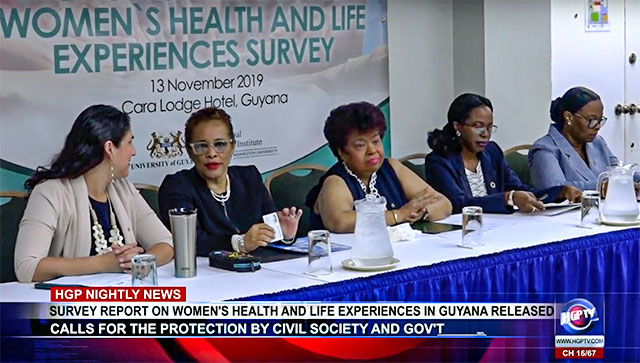GUYANA | 55% of Guyanese women violently beaten by their partner says UN study

GEORGETOWN, Guyana, October 10, 2021 - Data released by the United Nations, says intimate partner violence (IPV) is so pervasive in Guyana, more than one in every two women between the ages of 16 and 64, ot some 55% of all Guyanese women, have experienced such violence at least once in their lifetime.

The recently appointed United Nations Resident Co-ordinator in Guyana, Yesim Oruc, has pointed to the urgency with which Gender Based Violence (GBV) needs to be addressed, especially among youths, and considering the impact that the coronavirus pandemic has had on vulnerable populations such as women and children.
Oruc observed that the pamdemic has resulted in spikes in reported cases, and as a result, the United Nations has partnered with the European Union’s Spotlight Initiative and the Government of Guyana to launch a ‘Foundations Programme’ which seeks to strengthen prevention approaches to address gender-based violence in the Caribbean, specifically violence against women and girls within the context of family violence.
Advocating for a safer society,Oruc quoted the ‘Guyana Women’s Health and Life Experiences Survey of 2018’ which highlighted that solution to the country’s predicament must result in behavioural change in both men and women, especially since women themselves identify with beliefs that perpetuate inequality and increase the risk of suffering and violence.
“The prevention pillar recognises that tackling these beliefs at the root requires investments beyond sensitization [but] it needs us to look at this [gender-based violence] in a multi-pronged approach focusing on the individual, relationships, families, communities and the society,” Oruc indicated.
She explained that the foundation’s programme targets youths aged 13 to 24 to become advocates for the prevention of gender-based violence. The programme is intended to support participants in understanding how to address the root causes of GBV such as socially and culturally bound concepts of the values placed on women and men, in not only their personal lives, but socially as well.

The report indicated that violence against women and girls is commonly perpetrated by persons known to the victims, particularly by current or previous intimate partners. It is said that women and girls experience violence not only in public spaces, but at home — a location that is usually thought to be the safest place for women.
The United Nations and its partners have said that addressing violence against women and girls in Guyana, particularly intimate partner violence and sexual violence, is particularly challenging owing to the mindset that these issues are “private and personal family matters.”
The UN also pointed to the fact that victims are often blamed for the abuse, coupled with the fact that violence has become “normalised as part of the Guyanese culture” and relationships among Guyanese.

Shortly after assuming office in August 2020, Minister Persaud spearheaded the launch of a ‘914’ hotline which is geared specifically to address issues of violence, especially such acts committed against vulnerable groups such as women and children.
The Ministry of Human Services and Social Security had also created a support network for survivors of domestic violence. As part of this platform, survivors who have already dealt with most of their trauma, provide personalised comfort and guidance to those who are now going through the processes of escaping their abusers and seeking justice for the atrocities committed against them.
Only recently, the ministry also collaborated with the United Nations Population Fund to train a number of police officers as part of the CopSquad2000 initiative.
The programme saw the first batch of 21 ranks graduating from a two-week training. The entire programme aims to train 2,000 police officers as it pertains to gender-based violence and how to deal with gender-based crimes in a manner that would protect, rather than expose, exploit or deter victims from coming forward.
These trainings will also feed into the establishment of various domestic violence units which further assists in protecting survivors.
